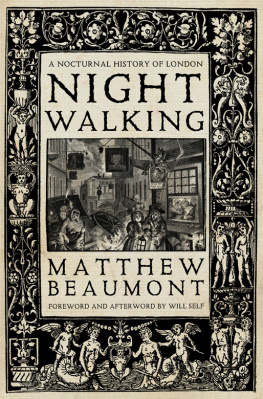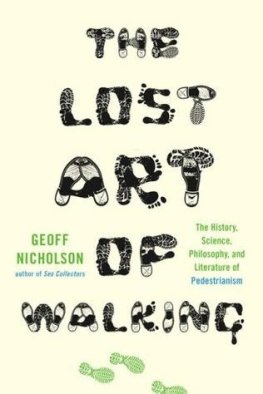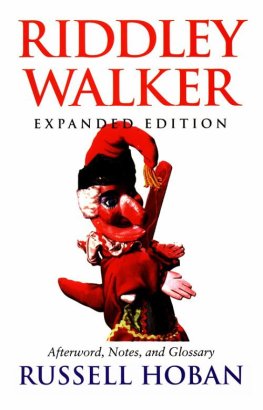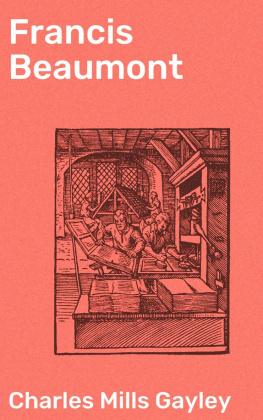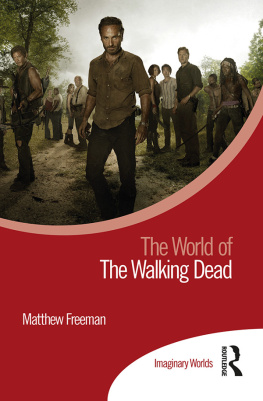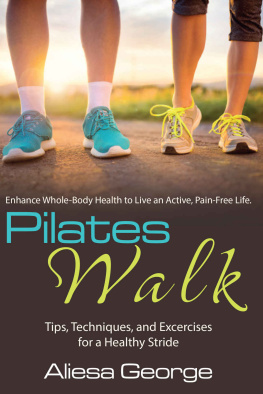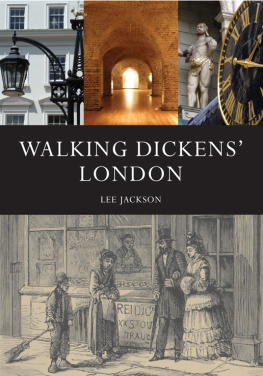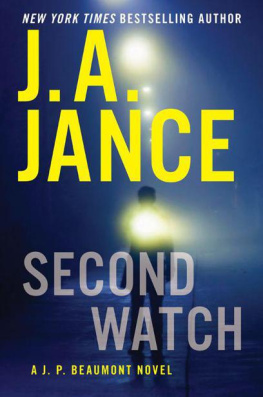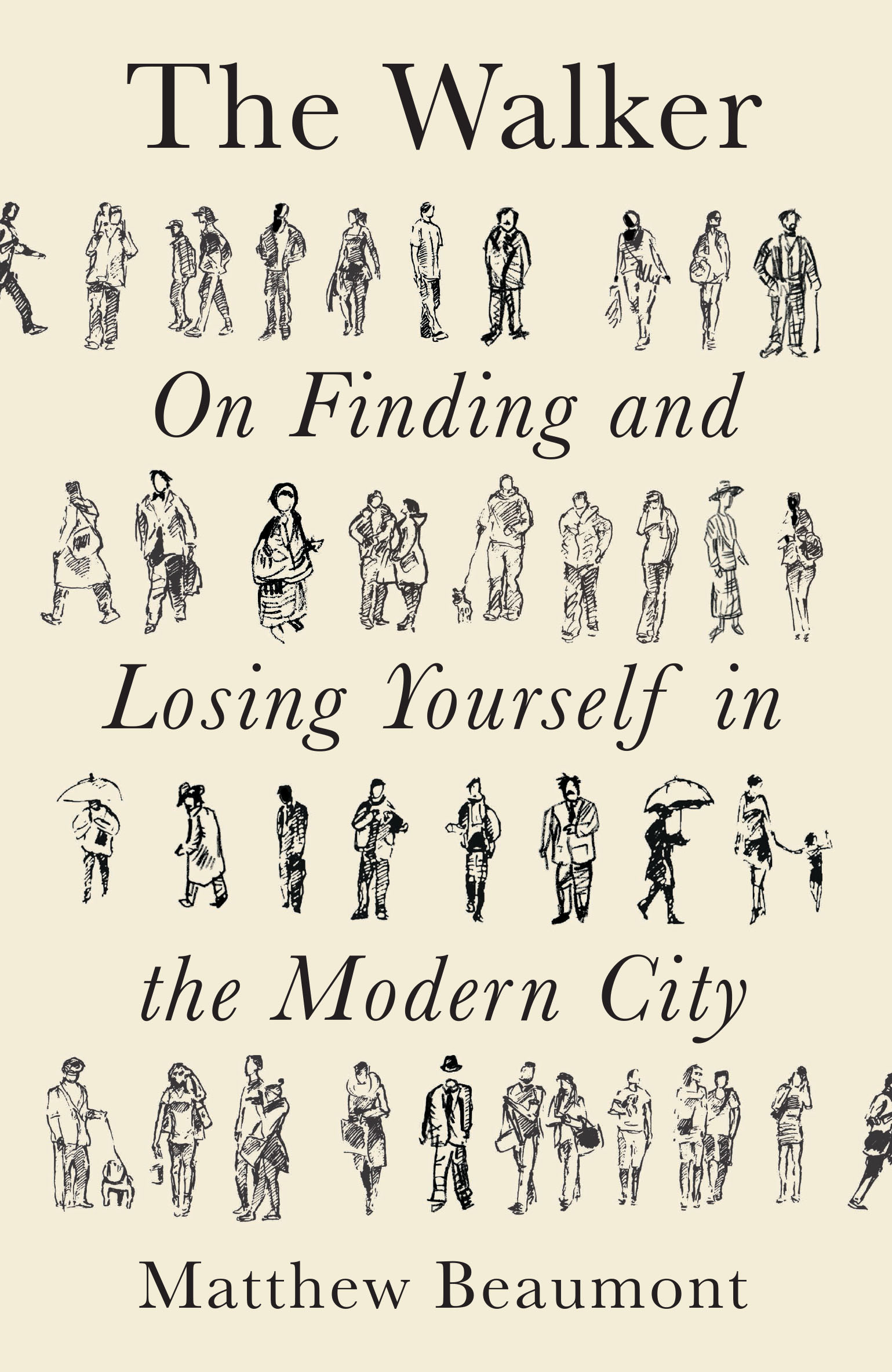
The Walker
The Walker
On Finding and
Losing Yourself in
the Modern City
Matthew Beaumont

First published by Verso 2020
Matthew Beaumont 2020
All rights reserved
The moral rights of the author have been asserted
1 3 5 7 9 10 8 6 4 2
Verso
UK: 6 Meard Street, London W1F 0EG
US: 20 Jay Street, Suite 1010, Brooklyn, NY 11201
versobooks.com
Verso is the imprint of New Left Books
ISBN-13: 978-1-78873-891-0
ISBN-13: 978-1-78873-894-1 (US EBK)
ISBN-13: 978-1-78873-893-4 (UK EBK)
British Library Cataloguing in Publication Data
A catalogue record for this book is available from the British Library
Library of Congress Cataloging-in-Publication Data
Names: Beaumont, Matthew, 1972 author.
Title: The walker : on finding and losing yourself in the modern city / Matthew Beaumont.
Description: London ; New York : Verso, 2020. | Includes bibliographical references and index. | Summary: Whether one considers Dickenss insomniac night-time perambulations or restless excursions through the faceless monuments of todays neoliberal city, the act of walking is one of self-discovery and escape, of disappearances and secret subversions. Pacing stride for stride alongside literary amblers and thinkers such as Edgar Allan Poe, Andr Breton, H. G. Wells, Virginia Woolf, Jean Rhys, and Ray Bradbury, Beaumont explores the relationship between the metropolis and its pedestrian life Provided by publisher.
Identifiers: LCCN 2020024743 (print) | LCCN 2020024744 (ebook) | ISBN 9781788738910 (hardback) | ISBN 9781788738941 (US ebk) | ISBN 9781788738934 (UK ebk)
Subjects: LCSH: English literature 19th century History and criticism. | Walking in literature. | City and town life in literature. | Pedestrians in literature. | Walking England History 19th century. |
England Civilization 19th century. | Modernism (Literature) Great Britain.
Classification: LCC PR468.W35 B43 2020 (print) | LCC PR468.W35
(ebook) |
DDC 820.9 dc23
LC record available at https://lccn.loc.gov/2020024743
LC ebook record available at https://lccn.loc.gov/2020024744
Typeset in Sabon by MJ & N Gavan, Truro, Cornwall
Printed in the UK by CPI Group (UK) Ltd, Croydon CR0 4YY
For Jordan and Aleem again;
and for Jake, Ruby, Jasmine and Max
As I walk, solitary, unattended,
Around me I hear that eclat of the world
Walt Whitman, As I Walk
These Broad Majestic Days
Contents
W hat are the politics of walking in the city? What are its poetics?
In Nadja (1928), Andr Bretons great surrealist novel, his autobiographical narrator at one point describes bringing a pile of books to a bar where he has made an arrangement to meet Nadja herself, who is fast becoming the object of his strange, not to say obsessive libidinal and spiritual investments. This pile of books includes a copy of Les pas perdus (1924), The Lost Steps, Bretons first collection of essays, which he no doubt brings, along with the first Manifesto of Surrealism (1924), in an attempt both to educate her and aggrandize himself. Lost steps? Nadja exclaims on seeing its title. But theres no such thing!
Theres no such thing as lost steps! If one were to search for the principle that epitomizes what, in an echo of the title of a book by the late Marshall Berman, might be called modernism in the streets, one could probably find it in this exclamation. It informs the writings of all those authors whose various, sometimes countervailing commitments to walking as a socially and psychologically meaningful activity I examine or reconstruct in this book. Those authors, that is, who consistently sought to make the cities with which they were familiar seem new or strange by traversing them aimlessly, sometimes desperately, on foot, in a state of heightened susceptibility to the relentless stimuli of the streets. But it is also a doctrine that, almost a century later, still resonates in the cities of today.
Certainly, it is the article of faith according to which, as a committed, even devout pedestrian, I like to live. No walk, as far as I am concerned, is ever wasted. In contrast, for example, to a car journey. In a city especially one dominated by cars, by individualistic rather than collective, private rather than public modes of transport it is walking that habitually makes me feel alive. It makes me feel both vitally connected to the citys ceaseless circuits of energy and, at the same time, delicately detached from them. Stimulant, then, and narcotic.
In the twenty-first century, in cities that are the site of acutely disorienting cycles of creative destruction, where pedestrians are increasingly inured to the environment they more and more mechanically inhabit, not least because of their dependence on the technology of smartphones and other hand-held devices, we need another modernism of the streets. And we need to celebrate some of those embattled individuals for whom, in the nineteenth and the first half of the twentieth centuries, at the high tide of industrial modernity, this activity was a sort of spiritual imperative; a vocation.
Theres no such thing as lost steps Nadja does a lot of loitering on the streets of Paris, so her reaction to the title of Bretons book, which I take to be spontaneously triumphant rather than merely defensive, is understandable. If you wander around the city, or hang about at street corners, things happen.
Of course, people might think as a result that youre a pimp or a prostitute or some other undesirable, and if youre a woman youll be especially exposed to demeaning assumptions of this sort; but things still happen. With any luck, in fact, you might encounter a Surrealist, as Nadja does. Or, thirty or forty years later, a situationist. These avant-gardists are committed to the idea that it is the street, above all other venues, that provides what Breton, in the essay that opens Les pas perdus, calls the surprising detours that shape a life in the conditions of capitalist modernity.
The street, with its cares and its glances, was my true element, Breton declares: there I could test like nowhere else the winds of possibility.of utopian potentialities can be tested. The street is the domain of the trivial; but as the etymological origin of this word suggests, derived from the Latin for a place at which three roads meet, typically at the volatile margins of the city where immigrants of all kinds congregate and circulate it is also a site of dynamic social experiment. It is a point of intersection, criss-crossed with restless feet, bristling with creative possibilities for collective life.
Breton, it can safely be assumed, agrees with Nadja that there are no lost steps. For her, as he formulates it in a sentence that Walter Benjamin later cited as the epigraph to his essay on Marseilles (1929), the streets are the only region of valid experience (la rue, pour elle seul champ dexprience valable). And walking, implicitly, is the only valid means of traversing this region or, better, field of experience (it is surely important, paradoxically, not to erase the ancient pastoral associations of this phrase). More specifically, that errant, meandering form of walking that is often classified as wandering is the only valid means of traversing this field of experience.
Like other Surrealists, and indeed like other modernists of every stripe, Breton believed that the footstep, as Michael Sheringham puts it in a phrase to which I will return, is the emblem of the free everyday. The footstep is an opportunity to escape the logic of abstraction, the logic of exchange-value constitutive of those modes of transport with which, in the industrial metropolis, the walker must compete, from automobiles to buses to trains. Every footfall, then, in contrast to the revolution of a set of wheels that travels along roads or tracks, is an adventure. A flight. It is open to surprising detours. And it is, at the same time, a faint imprint, on the pavements and other surfaces of the city, of these necessarily individual escapades.
Next page

